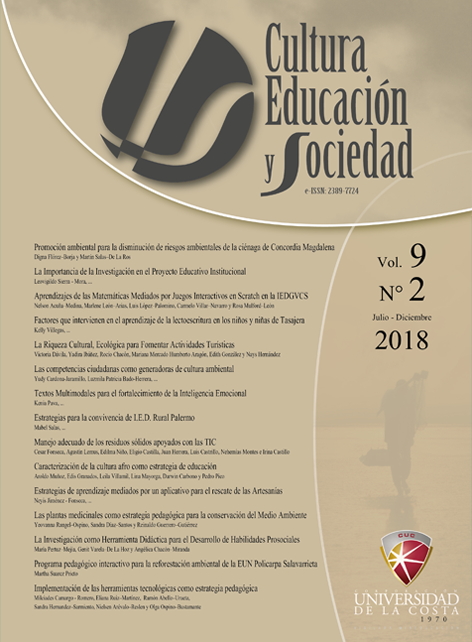Appropriate management of solid waste supported with ICT
DOI:
https://doi.org/10.17981/cultedusoc.9.2.2018.08Keywords:
Recycling; solid waste; significant learning; strategies; scientific knowledge; ICTAbstract
The recycling is the transformation of the forms and the habitual formats of the objects Cardboard, paper, tin, glass, some plastics and organic residues, in raw materials. The development of this research is then to design strategies oriented to the proper management of solid waste articulated to the different areas of IEDTHC knowledge supported by ICT. The research is approached from a qualitative perspective, of a descriptive nature, and the interview is used as a technique, and the individual rapporteurs. The participants were students of the 9th grades of the Tomás Herrera Cantillo educational institution. As a conclusion of using the IEP as pedagogical strategies and the use of ICT, they do not allow us to develop methodologies in order to find alternatives to the solution to the environmental problems that affect our educational community.
Downloads
References
Alcaldía de Envigado. (2011). Guía para el adecuado manejo de los residuos sólidos y peligrosos. Documento recuperado de: http://www.ambientalex.info/guias/Guia_manejo_residuos_sp.pdf
Avendaño ,I;Cortés O , Guerrero Hilda( 2015) Competencias sociales y tecnologías de la información y la comunicación como factores asociados al desempeño en estudiantes de básica primaria con experiencia de desplazamiento forzado Diversitas: Perspectivas en Psicología, vol. 11, núm. 1, 2015, pp. 13-36 Universidad Santo Tomás Bogotá, Colombia.http://www.scielo.org.co/pdf/dpp/v11n1/v11n1a02.pdf.
CANDELL, F. D. (2015). CREACIÓN DE UNA PLANTA DE RESIDUOS SÓLIDOS EN EL CANTÓN SALINAS, SECTOR PUNTA CARNERO. Santa Elena, Ecuador. Obtenido de http://repositorio.upse.edu.ec/bitstream/46000/1599/1/DROUET%20CANDELL%20FERNANDO.pdf
CEPIS. (2001). Marco conceptual de los residuos sólidos. Documento recuperado de: http://www.bvsde.paho.org/bvsars/e/fulltext/marco/marco.pdf
CONAM. (s.f). Guía para la implementación del programa piloto de reaprovechamiento de residuos sólidos en huamanga, Pucallpa y Tingo María. Documento recuperado de: http://www.bvsde.paho.org/bvsacd/cd27/guia-reapro.pdf
CORPAMAG. (2014). Plan de Gestión Ambiental Regional 2013-2027. Corporación autónoma Regional del Magdalena, Magdalena, Santa Marta. Obtenido de http://www.corpamag.gov.co/index.php/es/planeacion/plan-gestion-ambiental-regional
Dávila, O. H. (2012). Plan de Desarollo Municipal. (A. Municipal, Ed.) San Zenón, Colombia. Obtenido de http://cdim.esap.edu.co/BancoMedios/Documentos%20PDF/sanzenonmagdalenapd20122015.pdf
Duran, D. (14 de Noviembre de 2003). Eco-Portal.Net. Obtenido de Educación ambiental: https://www.ecoportal.net/temas-especiales/educacion-ambiental/escuela_ambiente_y_comunidad.
- Herrera-Tapias, B . (2011). El Estado Económico Constitucional de la Carta de 1991 frente al Derecho del Consumo REVISTA PENSAMIENTO JURIDICO NO. 32, ISSN 0122-1108. Septiembre-Diciembre 2011- Pág. 247- 264.
Hernandéz, D. (2011). Contabilidad ambiental: Fundamentos epistemológicos, humanistas y legales. ECONÓMICAS CUC” / Barranquilla - Colombia / Volumen 32 - No. 1 / pp. 35 a 44.
Ley de Residuos Sólidos. (s.f). Cómo y porqué separar las basuras. Documento recuperado de: http://www.bvsde.paho.org/bvsacd/cd48/juntos.pdf
Palmero, M. L. (2004). LA TEORÍA DEL APRENDIZAJE SIGNIFICATIVO. (C. d. Hernández, Ed.) Pamplona, España. Obtenido de http://cmc.ihmc.us/papers/cmc2004-290.pdf
Tamayo, M. (2004). El roceso de la investigación científica. (N. Editores, Ed.) D.F México, México: LIMUSA S.A. Obtenido de http://www.intep.edu.co/Es/Usuarios/Docentes/file/HelbertSalinas/Conocimiento_Cient.pdf
UNICEF. (2016). Cuadernillo de Medio Ambiente para comunidades indígenas. Argentila. Obtenido de https://www.unicef.org/argentina/spanish/manual-medioambiente-def2.pdf
UNICEF. (s.f). Experiencias urbanas de gestión integral de residuos en 10 municipios de Argentina. Documento recuperado de: https://www.unicef.org/argentina/spanish/EcoclubesbajaWEB.pdf
Downloads
Published
How to Cite
Issue
Section
License
Copyright (c) 2018 CULTURA EDUCACIÓN Y SOCIEDAD

This work is licensed under a Creative Commons Attribution-NonCommercial-NoDerivatives 4.0 International License.
![]()
Creative Commons 2020 CULTURA EDUCACIÓN Y SOCIEDAD
This article is under international license Creative Commons Reconocimiento-NoComercial-SinObrasDerivadas 4.0.
The published articles are the sole responsibility of their authors and do not necessarily reflect the opinions of the editorial committee.
CULTURA EDUCACIÓN Y SOCIEDAD respects the moral rights of its authors, who assign to the editorial committee the patrimonial rights of the published material. In turn, the authors inform that this work is unpublished and has not been previously published.
All articles are under a:
Licencia Creative Commons Atribución-NoComercial-SinDerivadas 4.0 Internacional.
![]()


 English
English
 Español (España)
Español (España)




_12.53_.27_p_. m_._3.png)





_12.57_.35_p_. m_._3.png)
_12.50_.37_p_. m_._3.png)



